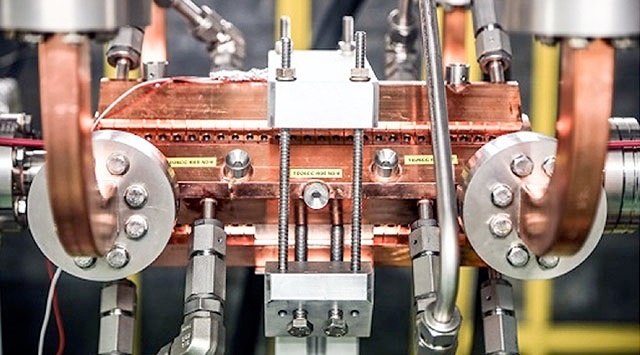Around 60 experts of research centres of all over the world will be gathered at the Institute of Corpuscular Physics, from 13 to 16 June, to improve the technology of High-Gradient Radio-Frequency, a new development in the system to accelerate particles that allow to reduce the size and complexity of the accelerators. This system is the base of the particle accelerators which are used in the research of the components of the matter and in different applications from Biology to Medicine. The IFIC finalises a laboratory to test new devices based on this technology and this infrastructure to research in Medical Physics IFIMED.
This is one of the reasons why the 10th edition of the International Workshop on Breakdown Science and High Gradient Technology (HG2017) takes place in Valencia, for the first time in Spain. The laboratory, which is built in IFIMED, is one of the few in Europe which will have capacity to test High-Gradient Radio-Frequency cavities, the devices which make possible the acceleration of particles. It will be the place where the resistance of materials to a physical phenomenon which reduces its capacity of acceleration, known as breakdown, will be tested.
In most particle accelerators, for the acceleration process it is used the radio-frequency cavities. If we apply to these cavities a variable electric field at high frequency, particles receive energy and the start to accelerate. The High-Gradient technology is an evolution of these cavities which works at high frequencies (12 GHz), applying energies up to 100 megavolts per metre to the particles. This is four times higher of what was achieved with these radio-frequency cavities a decade ago.
The fabrication of this type of cavities is complicated and it is still under development. When they are under high electric fields, the materials (generally copper) suffer physical processes that take capacity away in order to accelerate particles. One of the most decisive ones is the called breakdown, whose study is one of the main topics that will be spoken at the meeting. The radio-frequency laboratory of the IFIC will be the responsible of testing these developments, at first with several devices of high gradient in the CERN and, then, opening the collaboration to other laboratories and companies.
The main application of the High-Gradient Radio-Frequency is the generation of radiation using free-electron lasers (FEL), a type of radiation that is starting to have a lot of applications in crystallography or studies of cells biology, in Medicine, Biology or pharmaceutic industry. Moreover, the fact of allowing more compact particle accelerators make this technology interesting for the therapy with hard particles (hadron therapy) where one of the main disadvantages is the cost of the big particle accelerators that are needed.
More information:


